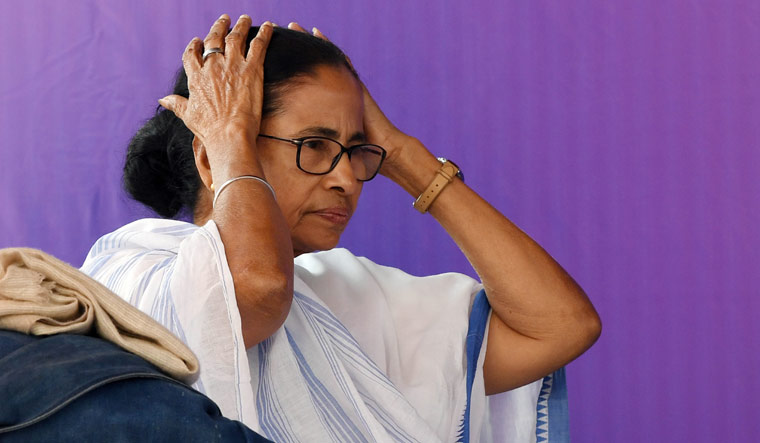West Bengal Chief Minister Mamata Banerjee's refusal to attend the Niti Aayog meeting convened by its chairman Prime Minister Narendra Modi has kicked up a political storm. With her refusal, it has been presumed that Mamata was not willing to let go the events that unfolded in West Bengal last month during the Lok Sabha election campaigns.
However, the Bengal chief minister reasoned out in a letter, which she shared with her non-BJP counterparts, that she would prefer the return of the Planning Commission instead of the current Niti Aayog, a 'paper tiger'.
She also demanded the revival of the Inter-State Council through which all the chief ministers got to meet the prime minister and other Union cabinet ministers to press their respective states' demands.
Mamata's decision to not attend the Niti Aayog meeting might prove to be politically incorrect as she has now ruined her chances of presenting her point to the 15th Finance Commission, headed by N. K. Singh. She lost a chance to directly pitch the pending projects of Bengal. These include two major ports, airports and even railway projects that she had conceptualised as a minister, but never saw the light of the day.
READ: Does Mamata's outreach to Prashant Kishore expose her nervousness?
It is presumed that Mamata was worried that she might be pulled up for Bengal opting out of the central projects like the Ayushman Bharat, if she attended the meeting. In the past, too, she had boycotted Niti Aayog meetings. Once she deputed her finance minister Amit Mitra for the same.
Sources have confirmed that she had a conversation with several chief ministers before writing to the prime minister. But none of the chief ministers have decided to toe her line of politics. The states that earlier refused to implement the Ayushman Bharat project have had a change of mind. Odisha CM Naveen Patnaik and Kerala's Pinarayi Vijayan are two glaring examples who are looking to engage with PM Modi for slight modifications to the project to suit their respective states.
However, Mamata seems to be adamant about playing politics first, as developmental issues take a backseat. She raised the issue of Bengali pride saying, “It was Netaji Subhash Chandra Bose” who set up the Planning Commission in British India when he was the Congress president.
Planning Commission and Inter-State Council
Bose had set up the Planning Commission in 1938 on the advice of scientist Meghnad Saha and appointed Vishveshwarya as its chairman. But the appointment was short-lived as Jawaharlal Nehru took over as the chief of the commission owing to political pressure.
However, in independent India, the Planning Commission or the Inter-State Council were never allowed to function apolitically and Mamata seems to have forgotten this fact. Ironically, with Mamata's objection, Niti Aayog is treading the same path as the Planning Commission.
A closer look at both the Niti Aayog and the Planning Commission would reveal that none of the bodies were set up with proper legislation in Parliament. The Planning Commission was neither a constitutional nor a statutory body.
Various governments had used the commission to suite their political will. While the first two five-year plans were accepted, there was a halt after that due to successive wars with China and Pakistan. There was again a halt in the seventies and nineties due to political instability.
Had the Planning Commission been a serious institution like the RBI, it would not have had such a bumpy ride. The Planning Commission reported only to the PM, and hence, basically served the role of an economic advisory body.
also read
- Mamata Banerjee announces release of first instalment of Banglar Bari housing scheme
- Congress’s guarded response after Mamata’s ‘ready to lead INDIA bloc’ remark
- WB Chief Minister Mamata Banerjee inaugurates 30th Kolkata International Film Festival
- Constitution, secularism take centre stage in TMC's rally against Waqf Amendment Bill
The Inter-State Council is the brainchild of former prime minister V.P. Singh, who accepted the Sarkaria Commission recommendation, to hear demands from the states. Members of the National Front, led by Jyoti Basu and N.T. Rama Rao, prodded Singh to constitute such a body.
And here comes the catch. The interests of both the Planning Commission and the Inter-State Council clashed against each other. If the Planning Commission's job was to chart out a five-year plan, approve projects and estimate the resources of the country in consultation with the states, then what was the need for a parallel council? More so, many developmental projects were held up or slowed down in the past due to the delay of approval from the Planning Commission's end.
Interestingly, Mamata herself was at the receiving end as many of her railway projects—mostly for Bengal—did not see the light of the day because it never got approved by the Planning Commission. Despite not being an elected body or a constitutional body, the commission used to act like a parallel government, often becoming a threat to development.
Union government sources said that both the bodies were downsized after a while. The Inter-State Council stopped functioning in 2016, while the Planning Commission converted to Niti Aayog and currently advises the prime minister on major policy decisions.
While Mamata pointed out that the Inter-State Council was set up under Article 263 of the Indian Constitution, what she did not mention was that such a body was set up under a presidential order and not by an act of Parliament. Presidential order is temporary in nature and the cabinet has the right to withdraw it.



